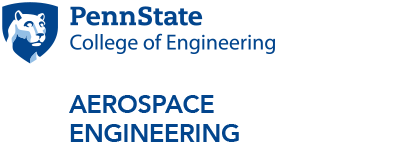
Graduate Research Opportunities
Research in the aerospace engineering department covers a broad spectrum of topics relevant to industry today and provides graduate students with the opportunity to embrace traditional fields like aerodynamics, propulsion, flight science, vehicle dynamics, aeroacoustics, and rotorcraft engineering, as well as leading-edge research areas such as UAVs, commercial space, nanomanufacturing, and wind energy.
Listed below are both current and potential projects within the department. If you are interested in working on any of these projects, please contact the principal investigator directly, stating why you are interested in the research opportunity and detailing your research experience.
If you are not a current Penn State student, and wish to apply, visit the How to Apply page for more details.
Fault-Tolerant Control: Developing fault tolerant and adaptive guidance and control systems to improve the safety and reliability of future aircraft systems. For example, a current effort is at an innovative Piasecki compound helicopter configuration; developing adaptive control laws for piloted simulation and flight test demonstration of damage-tolerant flight control.
Principal Investigators: Joseph Horn, Eric Johnson
Ultra-lightweight, Imperfection-resistant Structures
A graduate research assistantship will be available to study the design methodology, mechanics, and manufacturing of ultra-lightweight, imperfection-resistant structures. Inevitable manufacturing imperfections have hampered the design and application of lightweight aerospace structures and have greatly limited the potential of ultrathin materials that are currently available. This project aims at developing systematic numerical and experimental tools to address this grand challenge in aerospace engineering. More information about the Advanced Structures Laboratory led by Assistant Professor Xin Ning can be found on the lab’s website.
Simulation and Aeromechanics Modeling of Distributed Electric Propulsion Aircraft: This NASA-funded project seeks to develop advanced simulations and aeromechanics models for future DEP aircraft. A graduate research assistant will help develop simulations of the X-57 aircraft and other notional electric-powered aircraft (including eVTOL aircraft). The project will also involve advanced control design for distributed electric propulsion systems.
Principal Investigator: Joseph Horn
Using Ethical Frameworks for Human-Robot Decision Making: If this project is funded by the National Science Foundation, graduate research assistantships will be available to develop the computational underpinnings necessary to allow an autonomous robot to utilize different ethical frameworks in a context dependent manner.
Principal Investigator: Alan Wagner
Mission-Specific Unmanned Aircraft: Ongoing Office of Naval Research (ONR) project involving unmanned aircraft that can fly, as well as go underwater – being utilized to fly up rivers and along shorelines. Our efforts focus on challenges like obstacle avoidance, GPS-denied navigation, and aircraft design.
Principal Investigator: Eric Johnson
Developing a Unified Theory of Human-Robot Trust: If this project is funded by the Air Force Office of Scientific Research, graduate research assistantships will be available to develop, implement, and test methods for quantifying and evaluating human-robot trust during physically risk situations with a robot.
Principal Investigator: Alan Wagner
Dragonfly: If this project is funded by NASA, graduate research assistantships will be available to work on various aspects of the Dragonfly rotorcraft.
Principal Investigators: Jack Langelaan, Jose Palacios, Sven Schmitz
Automated Ship-Board Landing: If this proposed project is funded by NAVAIR, graduate research assistantships will be available to develop, implement, and test methods for autonomous landing on ships in high sea states. This work involves simulation as well as hardware implementation on autonomous aircraft.
Principal Investigators: Joseph Horn, Jack Langelaan
Computational Modeling of Pilot Spatial Awareness: If this proposed project is funded by the Federal Aviation Administration and industry partners, a graduate research assistantship will be available to extend computational models of pilot spatial awareness that combine extended Kalman filtering methods for estimation of state with physiologic models of pilot vestibular and visual sensing. The model will then be applied as a novel method for alerting pilots to possible upset conditions, and implemented in multiple medium and high-fidelity flight simulators around the nation for testing with pilots.
Principal Investigator: Amy Pritchett
Ship-board Operations: Precision maneuvering near underway surface vessels has some unique challenges. This project includes precision placement for landing and for manipulation (such as picking up packages). It involves multiple flight test operations over water operating on/off and near boats.
Principal Investigator: Eric Johnson
Astronaut Decision Aids for Eva Operations: If this proposed project is funded by NASA, a graduate research assistantship will be available to computationally model the "work" that human astronauts, robots, and mission controllers need to collectively perform for mission success, with particular attention to typifying mechanisms for effective human-robot interaction in space to support both safety and task efficiency. These models will then be used as the logic internal to decision aids for astronauts to plan and monitor EVA operations.
Principal Investigator: Amy Pritchett
Indoor Unmanned Aircraft Navigation: This effort involves indoor vision-based navigation amongst known and/or unknown objects. Known objects are utilized as navigation landmarks. The unknown can also be mapped and used to refine navigation solution (such as to prevent collision). This work includes characterizing a variety of available sensors and developing and testing solutions for practical indoor flight.
Principal Investigator: Eric Johnson
Aero-Thermal Performance Issues In Aero-Propulsion Systems and Gas Turbine Power Generators: The current projects deal with HP turbine tip leakage mitigation and novel casing designs. A large-scale axial turbine aero-thermal research rig with a complete stage and proper computational infrastructure exists. The most current work includes design of high-pressure ratio and compact mixed-flow compressors for aero-propulsion purposes, especially for UAV systems.
Principal Investigator: Cengiz Camci
High-speed Unmanned Aircraft Automation: Developing technology to enable high speed flight using vision sensors. Applications include autonomous drone racing and enabling nap-of-the-Earth flight to reduce vulnerability.
Principal Investigator: Eric Johnson
Manufacturing of Advanced Composites: If this project is funded, graduate research assistantships will be available to work on scalable manufacturing of hierarchically structured fiber-reinforced plastics with advanced properties and lighter weight.
Principal Investigators: Namiko Yamamoto, Charles Bakis



